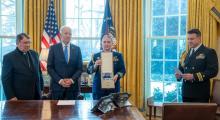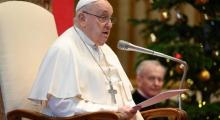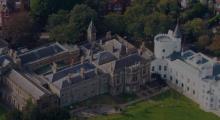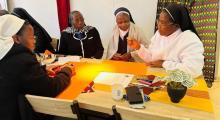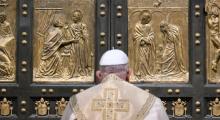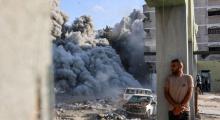Issued by the Catholic Center for Studies and Media - Jordan. Editor-in-chief Fr. Rif'at Bader - موقع أبونا abouna.org
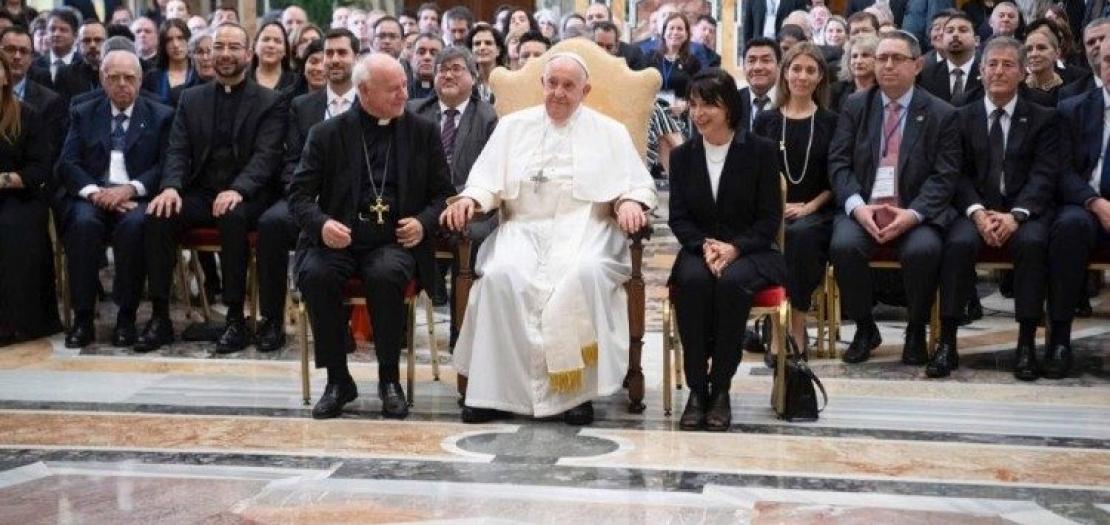
The name of Pope Francis' next Apostolic Exhortation on the environment will be Laudate Deum, Pope Francis has revealed.
The Holy Father shared this on Thursday, September 21 when addressing in the Vatican some 200 participants in the meeting of the Rectors of public and private universities of Latin America and the Caribbean, sponsored by the Red de Universidades para el Cuidado de la Casa Común and the Pontifical Commission for Latin America on Sept. 20 and 21 at the Augustinianum on the theme "Organizing Hope," with the participation of some Prefects and Secretaries of Dicasteries of the Holy See.
During the occasion, the Pope reflected on various issues raised by the educators, including climate change, migration, and the culture of waste.
The Holy Father urged them to be creative in the formation of young people from today's realities and challenges. The rectors asked the Pope questions on environmental and climate issues to which he responded by emphasizing the deplorable "throwaway culture or culture of abandonment." He explained that it is "a culture of misuse of natural resources, which does not accompany nature to full development and does not let it live. This culture of abandonment," he said, "harms all of us."
The proper use of nature
Pope Francis also described it from the human point of view: "There is a throwaway culture that is always going on, there is a lack of education to use the things that remain, to remake them, to replace them in the order of the common use of things. And this throwaway culture also affects nature." And he insisted on the urgency of returning to the proper use of nature: "Today humanity is tired of this misuse of nature, and must return to the path of good use of nature. And how we use nature, a word that may sound strange, I would say: dialogue with nature, dialogue."
To this end, the Pope urged universities to create networks of awareness. "And at this point, you use a very beautiful word, which is organizing hope."
"Reclaiming and organizing hope," Pope Francis said, "I like this phrase that you have said to me and one cannot help but consider it in the context of integral ecology, in this dimension according to which the youth of today have the right to a balanced cosmos and they have the right to hope and we have to help them to organize this hope, to make very serious decisions from this moment."
Nature is for all
Pope Francis also alluded to a "regenerative culture," identifying it as the fruit "of an economic crisis that is not always at the service of the development of the most needy. I would say that sometimes, or many times, it is not at the service of the development of everyone and creates more people in need. It is a culture of dispossession, we all have the right to the use of nature," to dominion over nature to make it grow and use it for the common good.
The Pope expressed his concern about "some abstract scientific type universities" that "do not use reality but science, an abstract science, not real, and so they walk on economic theories, social theories, everything is theory, but they never land" on the reality of the most needy. "The discarded, the outcasts, are men and women, whole peoples that we leave on the street like garbage, are they not? We have to be aware that we use the wealth of nature only for small groups through socio-economic theories that do not integrate nature, the discarded."
"Laudate Deum," the title of the next Apostolic Exhortation
Pope Francis called for alternatives to help overcome the environmental crisis and cited as an example the use of solar panels to provide electricity to Paul VI Hall and other areas of the Vatican. "We have to be very creative in these things to protect nature" because obviously electricity is made on the basis of coal or other elements, which always create problems in nature itself and "the young people we train have to become leaders on this point, convinced."
In his reflection, the Pope announced the name of his next Apostolic Exhortation: Laudate Deum, which will be published on the feast day of St. Francis of Assisi, Oct. 4: "a look at what has happened and say what needs to be done," he said.
Human and environmental degradation go together
The Holy Father also denounced the process of degradation that humanity is undergoing.
"There is a process of environmental degradation, we can say that in general. But this leads down, to the bottom of the ravine. Degradation of living conditions, degradation of the values that justify these living conditions, because they go together." And he explained that "inequality" is also "evident in the lack of access to basic necessities, and from here come all those visions that sociologically, in fact, without naming them, make women, indigenous peoples, Africans, people with fewer capabilities."
One of the forms of degradation and inequality, Pope Francis denounced, is "extractivism," that is, the hoarding of natural resources. "When this extractivist model goes on and enters people," he pointed out, "I extract the dignity of people, and this happens, never a geological extractivist model, so to speak, goes alone, it is always accompanied by the human extractivist model, the dignity of the person is extracted, they are slaves, said in another word. And please get this into children's heads, value education, so that they can evaluate these situations and can say clearly that this is called slavery."
Politics as the noblest vocation
Faced with this situation, the Pope called on university rectors to promote education in humanistic values and fraternal dialogue, helping students "enter politics" as a "noble vocation."
"Let us not forget that the noblest vocation of the human person is politics. Let us train our young people to be politicians, in the broadest sense of the term. Let us not forget that the noblest vocation of the human person is politics. We must train our young people to be politicians, in the broadest sense of the word. Not only to act in a political party, which is a small group, but to have political openness and to know how to dialogue with political groups with maturity, politics is not a disease, in my opinion it is the noblest vocation in a society, because it is the one that carries out development processes."
A human and Christian response to the migration crisis
The Pope also spoke about the current migration crisis.
"The migration drama in Europe today is extremely serious, extremely serious. And it cannot be solved by a mutual aid society, no. Here there is a humanistic and Christian question. Here there is a humanistic issue and a political decision, there are decisions that are human and Christian."
"I ask you," the Pope told the rectors, "out of respect for suffering humanity, to address this issue in your universities, but with the human density that it has. "So in summary I say this to you: migrants must be welcomed, accompanied, promoted and integrated. If we fail to integrate the migrant, we fail," he added.
"I want to say all this about migrants because the problem of migrants is very close to my heart," the Pope said again. He went on to say that "it is criminal what is being done today, here in Europe, sending them back, it is criminal. And I don't want to use euphemisms, I tell it like it is."
The three human languages: head, heart and hands
After reviewing all these situations, the Pope reminded that the task of universities should not be only to "teach things." "You must train boys and girls in the three human languages, that of the head, that of the heart and that of the hands.
"So that they learn to think what they feel and what they do, to feel what they do and what they think, and to do what they feel and what they think." Finally, he thanked those present and summed up his words by calling on universities to be: "creative in the face of reality and challenges, educators and not just dispensers of information."


